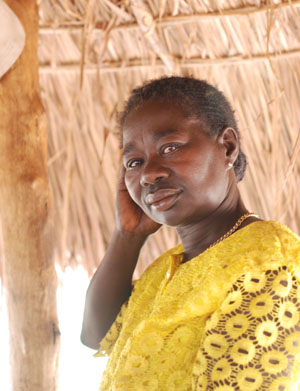
MAKPANDU REFUGEE CAMP, Southern Sudan — Mama Francoise was impeccably dressed. She ducked under the dense straw canopy just moments after the “village” chief here in Makpandu refugee camp sent someone to fetch her, so it was clear that the vibrant green and blue fabric wrapped around her waist, bright yellow lacy top, gold chain, and dainty gold earrings were part of Mama Francoise’s daily attire; she wasn’t dressing up for the visitors.
From the bright Congolese fabric, her command of French, and her dissatisfaction with the type of food she was receiving in the camp, it was clear that Francoise was not at home. “These people don’t know maize flour; they know rice,” our interpreter explained. And despite the lingering threat of the Lord’s Resistance Army in Francoise’s hometown, she says she has no intention of staying here in a refugee camp in southern Sudan.
“As soon as I harvest my groundnuts, I’m going to go home,” she said.
Situated just over an hour’s drive from the border with Congo, the U.N. refugee agency opened Makpandu to accommodate some of the thousands of Congolese refugees that flooded over the border into Sudan when the LRA moved its campaign of terror into the dense jungle of northeastern Congo. The camp is currently home to over 2,700 people.
“I had heard that a Ugandan militia had attacked in Garamba National Park [in northeastern Congo] and killed some of the park rangers,” Francoise explained. “But I had never seen the LRA or heard much about them until they came to my village.”
In fact, the day the LRA struck, Francoise wasn’t in her village. She and her daughter had traveled to Duru, a larger town about 22 kilometers from her home, to go to the market. In broad daylight, the LRA appeared and began attacking, some armed with rudimentary weapons like machetes and clubs, others with guns.
People from around the area fled, as the LRA attacked multiple villages. As she ran toward Sudan, Francoise learned that her own village was targeted too. The militia had corralled her husband and some of the other older people into a house and burned it down. Her son was captured by the LRA.
Mama Francoise recently got word that her son had escaped after five months with the LRA. Francoise thinks he has returned home now, though she has little news of him, and she’s not sure he knows that she is in Sudan.
Thinking that her son’s escape would be the bright spot in this tragic story, we started to ask follow up questions about how they might be reunited, but Mama Francoise’s sudden tears deterred us. “We cannot talk of him,” she said quietly, after a long pause. Perhaps the future feels too uncertain to hypothesize about what may come next.
When our conversation shifted to life before the LRA threat, Francoise brightened. She spoke lovingly of her husband, a high school teacher who taught geography and French. The pair had met when Francoise was 15 years old, and they married soon after. Francoise was also a teacher; she taught in a nursery school in their town.
The calm in her voice as she described her previous life gave the impression that Francoise was reminiscing about a long-lost childhood, a time when she took for granted the relative privilege her family enjoyed. In reality, the dramatic turn of events that landed Francoise in the refugee camp began unfolding around this time last year. January will mark one year of living at Makpandu camp.
When we inquired after her daughter, Francoise shook her head. “She is not well,” she said, though it was unclear whether her daughter is ill or suffers from the challenges that pain all the residents in this temporary refuge. “We’re not happy here. There is no good treatment, no food, no one to hear our complaints. No one cares,” she added.
We asked when the groundnuts would be ready for harvest. The end of December, Francoise said. She will only be here a couple more weeks.
The U.N. refugee agency will transport people back to their homes once the U.N. deems an area secure. For now, Francoise’s hometown is still at risk of attack by the LRA, so she will make the journey alone with her daughter. Mama Francoise says she doesn’t know what to expect at home, but even the unknown is preferable to the life in this camp that she knows too well.
Please see this post to hear the story of Clementine, another woman we interviewed for this series about Makpandu refugee camp.

